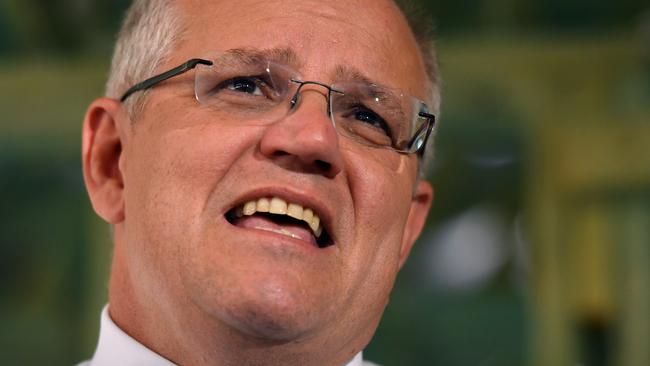Beijing accounts bash Morrison and Liberals
A propaganda campaign is being waged against Scott Morrison and the Liberals via WeChat.

A propaganda campaign is being waged against Scott Morrison and the Liberal Party via Chinese government-linked WeChat accounts in the lead-up to the election as Labor signals a more pragmatic approach to Beijing, focusing on bilateral economic ties.
Cyber researchers Michael Jensen, Titus Chen and Tom Sear found attacks on the Prime Minister and the Liberals topped the list of Australia-related posts on the Chinese social media services over a five-month period to March.
They analysed the Australian content on 47 of the most popular WeChat accounts in mainland China, 29 of them aligned with the Chinese Communist Party, finding accounts aligned more closely with the government demonstrated a clear “anti-Liberal” bias.
“They see basically Scott Morrison as a continuation of Malcolm Turnbull, who they were highly critical of, given his role in bringing to passage the foreign influence laws which came into effect last year,” Dr Jensen, a University of Canberra researcher, told a security conference yesterday.
He said there was also “a lot of critique” of Australia’s involvement in the Five Eyes security network with the US, Britain, Canada and New Zealand, and of Australia’s decision to exclude Huawei from the 5G network.
Dr Jensen said Bill Shorten was not mentioned in a single post seen by the team.
One of the posts, by influential news service Xincaimi, accuses Mr Morrison of introducing “poison to his own country” because he had relaxed restrictions on the importation of kava, a mild narcotic used by Pacific Islanders.
“In order to defeat China, Australia will not hesitate to use poison! Can China win this contest?” the post said.
In another, the official Global Times account accused Mr Morrison of publicly declaring that “women should not realise their rights at the expense of men”, contrasting his paraphrased comments unfavourably with those attributed to Russian President Vladimir Putin and Pakistani Prime Minister Imran Khan.
A third example raised by the researchers claimed Australia had been “kicked hard by kangaroos”, was politically unstable, and that Mr Morrison would “have to go even before the bench he sits on is warm”.
Dr Jensen said WeChat posts examined by the research team also alleged “some acts of corruption going on” in relation to the recent water buyback scandal involving Nationals MP Barnaby Joyce and Liberal frontbencher Angus Taylor, known online as #watergate.
The anti-Liberal push by the Chinese government-linked WeChat accounts is in contrast to a wave of fake posts targeting the Shorten campaign domestically as Labor battles with the Liberal Party to win seats with big Chinese-Australian populations, including Chisholm in Victoria, and the Sydney seats of Banks, Reid and Bennelong.
The China relationship was dramatically introduced into the campaign on Sunday by former prime minister Paul Keating, who claimed the nation’s security agencies had gone “berko” over Beijing.
Liberal frontbencher Simon Birmingham said Mr Keating was “not an isolated figure” in the Labor Party when it came to his views on China.
Labor has declared it will seek to reframe the China relationship, saying a Shorten government would not view China “through the strategic prism of worst-case scenario”. Labor defence spokesman Richard Marles accused the Coalition of “politicising” the relationship with Beijing, saying Australia could not afford to “deal with China gratuitously”.




To join the conversation, please log in. Don't have an account? Register
Join the conversation, you are commenting as Logout